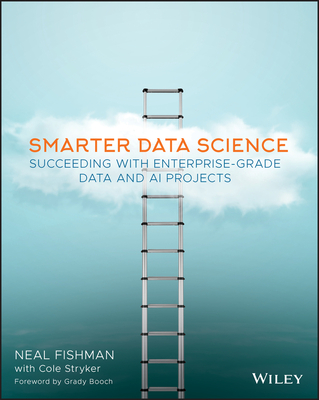Common Information Models for an Open, Analytical, and Agile World (Hardcover)
暫譯: 開放、分析及敏捷世界的通用資訊模型 (精裝版)
Mandy Chessell, Gandhi Sivakumar, Dan Wolfson, Kerard Hogg, Ray Harishankar
- 出版商: IBM Press
- 出版日期: 2015-05-17
- 售價: $1,440
- 貴賓價: 9.5 折 $1,368
- 語言: 英文
- 頁數: 240
- 裝訂: Hardcover
- ISBN: 0133366154
- ISBN-13: 9780133366150
-
相關分類:
Agile Software
立即出貨 (庫存 < 3)
買這商品的人也買了...
-
 $1,045Computer Vision and Fuzzy Neural Systems (Hardcover)
$1,045Computer Vision and Fuzzy Neural Systems (Hardcover) -
 $1,362Fundamentals of Data Structures in C, 2/e (Paperback)
$1,362Fundamentals of Data Structures in C, 2/e (Paperback) -
 HTML & CSS : 網站設計建置優化之道 (HTML and CSS: Design and Build Websites)
HTML & CSS : 網站設計建置優化之道 (HTML and CSS: Design and Build Websites)$580$458 -
 Arduino UNO R3 開發板(副廠相容版)附傳輸線
Arduino UNO R3 開發板(副廠相容版)附傳輸線$400$380 -
 猛虎出柙雙劍合璧版-最新 OCA / OCP Java SE 7 Programmer 專業認證
猛虎出柙雙劍合璧版-最新 OCA / OCP Java SE 7 Programmer 專業認證$880$695 -
 Raspberry Pi Camera Module
Raspberry Pi Camera Module$950$903 -
 DHT11 溫濕度感測器
DHT11 溫濕度感測器$120$114 -
 Matlab 程式設計, 2/e
Matlab 程式設計, 2/e$680$537 -
 $1,519The Definitive Guide to ARM Cortex-M3 and Cortex-M4 Processors, 3/e (Paperback)
$1,519The Definitive Guide to ARM Cortex-M3 and Cortex-M4 Processors, 3/e (Paperback) -
 XBee FTDI 轉接板(XBee usb adapter)
XBee FTDI 轉接板(XBee usb adapter)$300$285 -
 DHT22 驅動程式學習套件
DHT22 驅動程式學習套件$320$304 -
 Office 2013 範例教本 ─ 商務應用篇
Office 2013 範例教本 ─ 商務應用篇$490$441 -
 Swift初學特訓班--iOS App 開發快速養成與實戰(附近3小時新手入門與關鍵影音教學/全書範例程式)
Swift初學特訓班--iOS App 開發快速養成與實戰(附近3小時新手入門與關鍵影音教學/全書範例程式)$420$332 -
 利用R語言打通大數據的經脈
利用R語言打通大數據的經脈$490$417 -
 $1,330Introduction to Java Programming : Comprehensive Version, 10/e (IE-Paperback)
$1,330Introduction to Java Programming : Comprehensive Version, 10/e (IE-Paperback) -
 Python 程式設計入門 (適用於 2.x 與 3.x 版)
Python 程式設計入門 (適用於 2.x 與 3.x 版)$620$484 -
 $1,156Database Systems: A Practical Approach to Design, Implementation and Management, 6/e (IE-Paperback)【內含Access Code,經刮除不受退】
$1,156Database Systems: A Practical Approach to Design, Implementation and Management, 6/e (IE-Paperback)【內含Access Code,經刮除不受退】 -
 Linux 就是這麼一回事!一定看得懂的 Linux 學習書
Linux 就是這麼一回事!一定看得懂的 Linux 學習書$680$537 -
 機器學習駭客秘笈 (Machine Learning for Hackers)
機器學習駭客秘笈 (Machine Learning for Hackers)$680$537 -
 最新計算機概論 2016
最新計算機概論 2016$520$468 -
 完全詳解!Android App 活用事典
完全詳解!Android App 活用事典$320$272 -
 暢銷紀念版!包裝紙盒設計:基本盒形結構448例
暢銷紀念版!包裝紙盒設計:基本盒形結構448例$380$296 -
 完整學會 Git, GitHub, Git Server 的24堂課
完整學會 Git, GitHub, Git Server 的24堂課$360$284 -
 ASP.NET 專題實務 I -- C#入門實戰 (VS 2015版)
ASP.NET 專題實務 I -- C#入門實戰 (VS 2015版)$820$648 -
 Raspberry Pi 官方 7吋 觸控螢幕
Raspberry Pi 官方 7吋 觸控螢幕$3,050$2,898
商品描述
Foreword by Tim Vincent, IBM Fellow and Vice President, CTO for IBM Analytics Group
To drive maximum value from complex IT projects, IT professionals need a deep understanding of the information their projects will use. Too often, however, IT treats information as an afterthought: the “poor stepchild” behind applications and infrastructure. That needs to change. This book will help you change it.
Five senior IBM architects show you how to use information-centric views to give data a central role in project design and delivery. Using Common Information Models (CIM), you learn how to standardize the way you represent information, making it easier to design, deploy, and evolve even the most complex systems.
Using a complete case study, the authors explain what CIMs are, how to build them, and how to maintain them. You learn how to clarify the structure, meaning, and intent of any information you may exchange, and then use your CIM to improve integration, collaboration, and agility.
In today’s mobile, cloud, and analytics environments, your information is more valuable than ever. To build systems that make the most of it, start right here.
Coverage Includes
• Mastering best practices for building and maintaining a CIM
• Understanding CIM components and artifacts: scope, perspectives, and depth of detail
• Choosing the right patterns for structuring your CIM
• Integrating a CIM into broader governance
• Using tools to manage your CIM more effectively
• Recognizing the importance of non-functional characteristics, such as availability, performance, and security, in system design
• Growing CIM value by expanding their scope and usage
• Previewing the future of CIMs
商品描述(中文翻譯)
**最大化您在最複雜的 IT 專案中資訊的價值**
*前言由 Tim Vincent,IBM Fellow 及 IBM Analytics Group 副總裁兼首席技術官撰寫*
為了從複雜的 IT 專案中獲取最大價值,IT 專業人員需要深入了解其專案所使用的資訊。然而,IT 通常將資訊視為附帶考量:在應用程式和基礎設施背後的「可憐的繼子」。*這需要改變。* *這本書將幫助您改變這一點。*
五位資深的 IBM 架構師將向您展示如何使用以資訊為中心的視角,讓數據在專案設計和交付中扮演核心角色。透過使用通用資訊模型(Common Information Models, CIM),您將學習如何標準化資訊的表示方式,使設計、部署和演進即使是最複雜的系統也變得更容易。
透過完整的案例研究,作者解釋了 CIM 是什麼、如何構建它們以及如何維護它們。您將學習如何澄清您可能交換的任何資訊的結構、意義和意圖,然後使用您的 CIM 來改善整合、協作和敏捷性。
在當今的行動、雲端和分析環境中,*您的資訊比以往任何時候都更有價值*。要建立充分利用這些資訊的系統,請從這裡開始。
涵蓋內容包括
• 掌握構建和維護 CIM 的最佳實踐
• 理解 CIM 的組件和工件:範圍、視角和細節深度
• 選擇適合的模式來結構化您的 CIM
• 將 CIM 整合到更廣泛的治理中
• 使用工具更有效地管理您的 CIM
• 認識到非功能性特徵(如可用性、性能和安全性)在系統設計中的重要性
• 通過擴大 CIM 的範圍和使用來增長其價值
• 預覽 CIM 的未來



























